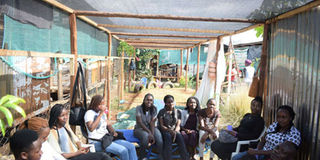Diary of a Poultry farmer: A day on the farm with varsity students

The writer (bottom right) with some of the Strathmore University students who paid him a visit in his Njiru farm. He advised them that learning comes not only from what has worked and why, but also what has not worked and why not. PHOTO | MANTUI TURGO | NATION MEDIA GROUP
What you need to know:
- When students and practitioners listen to first-hand experiences of each other, they are able to draw out useful insights most relevant to them.
- Later, I learnt that the demand for chicken reared under free-range production systems outstrips supply due to its lean meat and taste and yellow-yolked eggs.
- Don’t wait for the point when you have the perfect plan, adequate finances and you’ve answered every possible question, as you’re never going to be 100 per cent certain.
- Learning comes not only from what has worked and why, but also what has not worked and why not.
A month ago, I received a WhatsApp message from Tumaini, a student from Strathmore University.
It went, “We’d like to visit your poultry farm to learn more about chicken rearing.”
In the past, I used to get a lot of visitors to my farm in Njiru on the outskirts of Nairobi. Not anymore.
You see, after encountering deadly disease outbreaks last year, I developed strict protocols to limit human and vehicle traffic to the farm.
But when I learnt the students were studying financial economics at Strathmore, I agreed to their visit as one of my desires is to encourage young people to get into agribusiness.
I believe in the idea that universities should interact with practitioners.
When students and practitioners listen to first-hand experiences of each other, they are able to draw out useful insights most relevant to them.
So last Saturday, I found myself sitting under a makeshift tent on the grass lawn between the rows of chicken coops with a group of 13 students barely in their early 20s.
For two hours, I was besieged with a barrage of endless questions. Lucy Kinyua started the interrogation, “When did you start rearing chicken and why?”
As you’d guess, like all big entrepreneurial ideas, mine started as a hobby.
Please bear with me if you’ve heard this story before. I’d travelled upcountry one Christmas and needed to buy chicken meat for my visitors.
After a painstaking search, I finally got someone selling chicken, but each at Sh1,500.
To my surprise, when I weighed, it was barely a kilo. Honestly, that money was enough for 5kg of beef. I felt conned.
“How can a chicken roaming around aimlessly day-in, day-out with little input from the owner cost so much money?” I thought.
TRANSITION INTO AGRIBUSINESS
Later, I learnt that the demand for chicken reared under free-range production systems outstrips supply due to its lean meat and taste and yellow-yolked eggs.
The problem is that many farmers who rear Kienyeji chicken do so under out-dated animal husbandry practices where you let the birds out in the morning and pray that they come back in the evening.
The problem with this mode of production is the low output as a result of in-breeding, disease outbreaks, poor nutrition and predators (both animal and human).
At this point, Catherine Nabatanzi interjected to pose a different question. “Are you still running your venture as a hobby?” she wondered.
Before I could answer her question, Mantui Turgo asked what practical steps I’d taken to transition my business from a hobby to a profit-making enterprise.
Audrey Aidi and Shammah Wema then chipped in. “What was your start-up capital and net annual profit?”
When I mentioned that five-years down the line, I’d never realised a profit from the venture, I could see the disappointment on their faces.
To be fair, this is a fairly misunderstood point in entrepreneurship. That you first develop a plan, raise capital, develop a product, sell it and you make a profit or loss.
In my case, it’s been a journey of trial-and-error, making small steps at a time and learning as I go.
“Don’t wait for the point when you have the perfect plan, adequate finances and you’ve answered every possible question, as you’re never going to be 100 per cent certain,” I said.
FARMING AS A SIDE-HUSTLE
“If you have a solution to a problem that your customers really care about, then it doesn’t matter how long it takes to make a profit,” I added.
Tumaini then turned the conversation to how I started writing besides rearing chicken and what advice I’d give to anyone who wants to be a writer.
I summed up the answer to her question with one quote I read somewhere, “You are not what you write, but what you have read.”
I explained that writing is a skill requiring regular practice and, as a budding writer, if you can study and understand the writing style of successful writers, and then create your own, then you are in business.
“Learning comes not only from what has worked and why, but also what has not worked and why not,” I told the students.
Purity Namasaka, one of the students, was happy to learn that she can seek a job in another field is she does not get one in her line.
Better still, engage in farming as a side hustle.
We agreed to have more interactive meetings in the near future.





